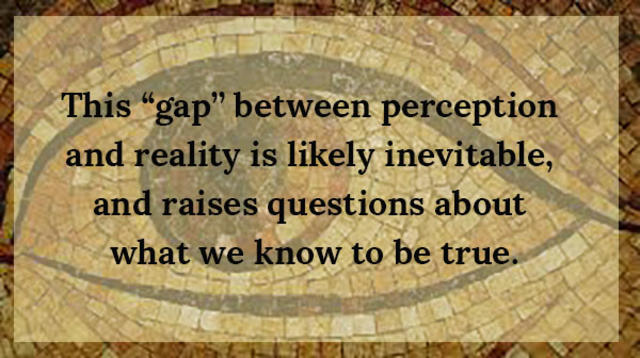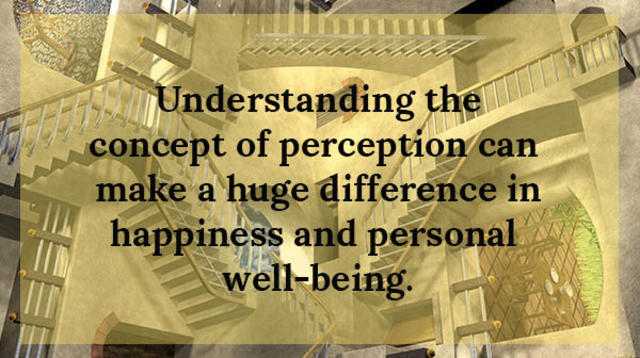Is There Really a Difference Between Perception and Reality?
If a tree falls in a forest, and no one is around to hear it, does it make a sound?
When addressing perception and reality, people’s thoughts on the subject always boil down to their answer to this age-old thought experiment. Those who say the tree does make a sound would argue that reality and perception are separate. Those who say the tree does not make a sound would speak to reality and perception being one and the same. Despite these broad concepts, there is an answer: perception and reality are different. We can look to both the meaning we assign these words and to science to find a distinction.
The words themselves are not synonyms. Perception evolved from the early Latin word percipere, which means to understand or grasp. The word has maintained its connotation. Today, the Oxford Dictionary assigns it two definitions: “the way in which something is regarded, understood, or interpreted” and “the ability to see, hear, or become aware of something through the senses.” In both definitions, the word involves processing an object or event through a filter. The "something" is an entity as it exists in reality, and the filter is either the five senses or the moral outlook used to interpret the reality. Reality, as defined by Oxford Dictionary, is “the state of things as they actually exist, as opposed to an idealistic or notional idea of them.” Instead of being the method through which we observe a thing, reality is the nature or truth of this thing. Reality, in plain terms, is the way events actually unfold in the real world. Reality is unaffected by the filters and lenses through which it is observed, and therefore unaffected by a person's perception.

Optical illusions demonstrate how this impacts our own lives. Whether it is an intricate pattern that seems to be trapped in perpetual motion or the seemingly endless spiral of a barbershop pole, the image is not what it seems. If you were to ignore outside information and instead rely purely on your five senses for understanding the phenomena, you would perceive and believe that the illusion you’re witnessing is really taking place.
A more drastic example of a misconception caused by false perception is the Earth’s position in the cosmos. For much of modern human history, people believed the Earth was the center of the universe. People would look up and see the stars fill the sky in all directions, and it seemed like the Earth was the center of it all. Without background knowledge or a modern understanding of science, you would likely perceive that the Earth is the center of the universe as well. When European astrologists began to explore space and question the position of the Earth in our universe, it took a long time for the rest of society to accept the practice of questioning a fundamental belief, let alone the results. Nicolaus Copernicus’ heliocentric hypothesis, continued by Galileo, was met with much hostility. Even when they provided scientific evidence, people were too baffled by the prospect of misconceiving a basic principle. It was too unsettling, and it had heavy implications regarding religion and our ability as humans to understand our world. Perception can clearly create barriers to progress and an objective worldview.
These barriers do not only drive us away from an accurate understanding of our surroundings, they also drive us away from each other. Two major issues regarding perception can cause conflict: misperception about the situation at hand, and within that, the misperception of another’s perception. All forms of argument stem from this issue. When people argue, it is because they both view a topic in a different way. This disagreement sparks debate on which perception is right, and therefore how to act in the situation. From petty “he/she started it!” arguments between siblings to the ideological rifts that caused the American Civil War, disagreements over whose perception is closest to reality can affect the relationship between two people, or even between millions of people.

It is difficult to break these barriers. To disassociate bias from our outlook and have a more objective perception, or even to merely acknowledge and account for the separation between perception and reality, is no easy task. This “gap” between perception and reality is likely inevitable, and raises questions about what we know to be true. Does the world exist, or is life just a dream? Do we have free will, or are all of our actions predetermined by past events? Questioning the foundations of our world and lives is daunting. However, to reduce the weight of the task, we can start by dissociating the complex metaphysical concepts from the day to day applications of perception. There are many great questions that have baffled us and will continue to baffle us for centuries to come, but a more realistic goal is to instead try to reduce the thickness of the filter we inevitably put on reality when we attempt to observe it.
Understanding the concept of perception can make a huge difference in happiness and personal well-being. To see this, we can turn back time to the days of our early education. If you are American, you most likely sang “if you’re happy and you know it clap your hands” hundreds of times as a child. The tune is cheery and upbeat, and when I was little I would choose to clap along even when I was upset, then find myself in a better mood. Despite its simplicity, the song offers more insight than we might think. When hard times hit and life seems glum, it is easy to feel helpless. However, we can often look inwards and reflect on our perception in order to find the positivity we lack. To be told “look on the bright side” by others may be obnoxious and counterproductive while we are struggling, but when we do this for ourselves, we often find the solace we seek to get through tough times. While cautiously unraveling our presumptions, we can discover we may have overestimated the severity of an issue, and de-stress. If we can perceive a happier reality, within the realm of reason, we will know we are happier and therefore be happier. We can clap our hands and feel better.
Ironically, perception is an arbitrary concept. When discussing perception, the thoughts and standpoints of the people present would inhibit an objective conversation. I write about my thoughts on the word, yet they may be worthless. This essay is merely my perception of the word perception.

Jack Miles is a 16-year-old writer and editor from New York. When he's not writing, he enjoys spray painting, playing soccer, and singing with his choir.
